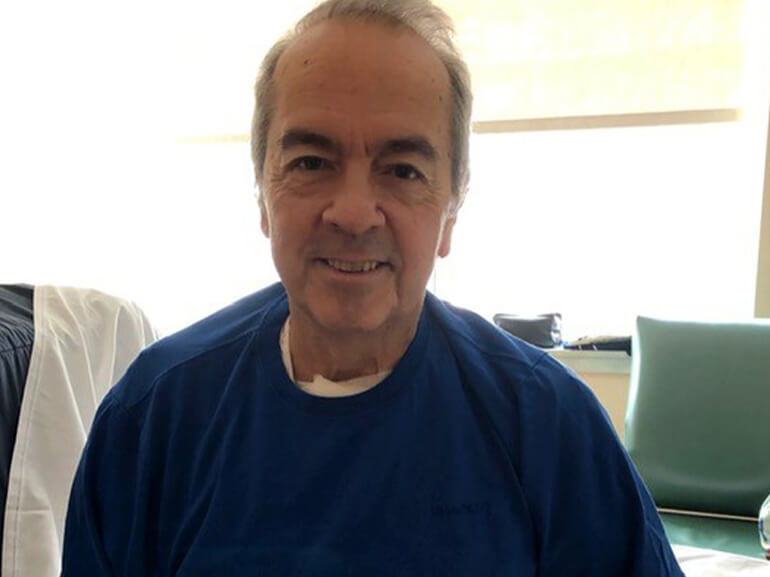Dennis' Story

Despite being fully vaccinated, Dennis Hamsher’s breakthrough COVID-19 case took a terrifying turn.
After an emergency room visit for chills and urinary tract infection symptoms, the insurance agency owner was admitted with COVID-19 pneumonia. The 67-year-old spent 12 days in the hospital before being sent home on Dexamethasone steroid treatments. When fever, chills, weakness and confusion returned, Dennis’ wife, Suzanne, and daughter, Mary, drove him back to the hospital.
Two days later, Dennis began having difficulty breathing. His heart stopped. Fluid was drained from his lungs and, after 10 minutes of CPR, it restarted. Transferred to intensive care, Dennis fell into respiratory failure, was sedated and connected to a ventilator.
Complications continued to cascade, including renal failure requiring continuous dialysis treatments to clear toxins from his blood. As sedatives were reduced, a new complication arose. Dennis’ body movements were uncoordinated and slow. Scans revealed he’d had a series of strokes and doctors recommended a tracheostomy for ongoing airway support, as well as a feeding tube.
After a month in intensive care, Dennis stabilized enough for the family to consider next steps in his ongoing recovery. The family chose Select Specialty Hospital – Harrisburg.
Dennis arrived with three goals in mind: to drink water again, removal of the tracheostomy and going home.
A physician-led team, including nurses and therapists, created a plan for success.
Respiratory therapists began to coach Dennis on breathing and conducted chest exercises, increasing lung function and stamina.
Physical and occupational therapists focused mobility. First, they moved Dennis’s arms and legs in range of motion exercises and encouraged in-bed movement. Early mobility has been shown to improve a patient’s chances of ventilator liberation, according to a study. In addition, movement enhances blood flow, perks up the senses and can improve mood.
Each day, Dennis progressed. He moved from to sitting, standing and walking with a therapist’s assistance. Physical therapists also taught him energy conservation techniques, which would balance his movement needs with his body’s ability to provide oxygen.
Walking was a key milestone because it signaled recovery was picking up speed. He was eventually able to navigate hallway walks.
Meanwhile, nurses kept Dennis comfortable, administered medication and repositioned him to avoid pressure injuries.
“The care, professionalism and attention of this staff was beyond impressive,” he said.
As COVID-19 visitation restrictions eased, Suzanne, their son Greg and Mary were able to rotate visits, staying at Dennis’ bedside to get updates and take notes from doctors and specialists.
Bleeding from his tracheostomy was the only nagging complication. Dennis needed additional procedures and time on the ventilator because of it. Eventually, pulmonologists determined his lungs were strong enough to liberate and the trach was removed.
“That was 90 percent of my problems,” Dennis said. “Once it was out, I was fine.”
Speech therapists added a variety of cognitive and verbal activities to reconnect problem-solving, memory and planning abilities. They also used mouth, tongue and jaw exercises to retrain Dennis’ swallowing reflex. Once tests indicated he could eat safely, dietitians crafted a meal plan that started with ice chips. In short order, Dennis was able to sip water. Then, he moved through pureed and soft foods, transitioning to regular meals.
After three weeks, Dennis realized his final goal and returned home to Suzanne. After noticing lingering side effects from the viral battle, he decided to undergo several weeks of reconditioning at a Select Physical Therapy outpatient center near his home.
There, under the supervision of a physical therapist, Dennis performed exercises that increased stamina, core stability and strength in his arms and legs.
Dennis offered some advice from his experience: “Just let stuff happen and trust the experts – even if you are skeptical. Select Specialty Hospital has the best respiratory care around, and they know what they’re doing.”